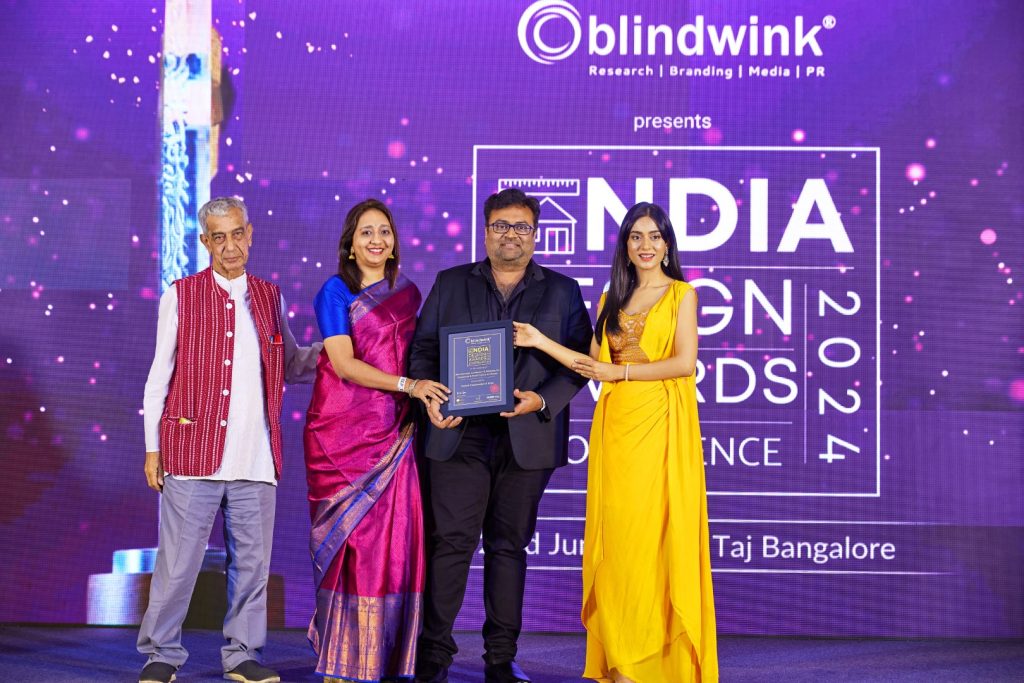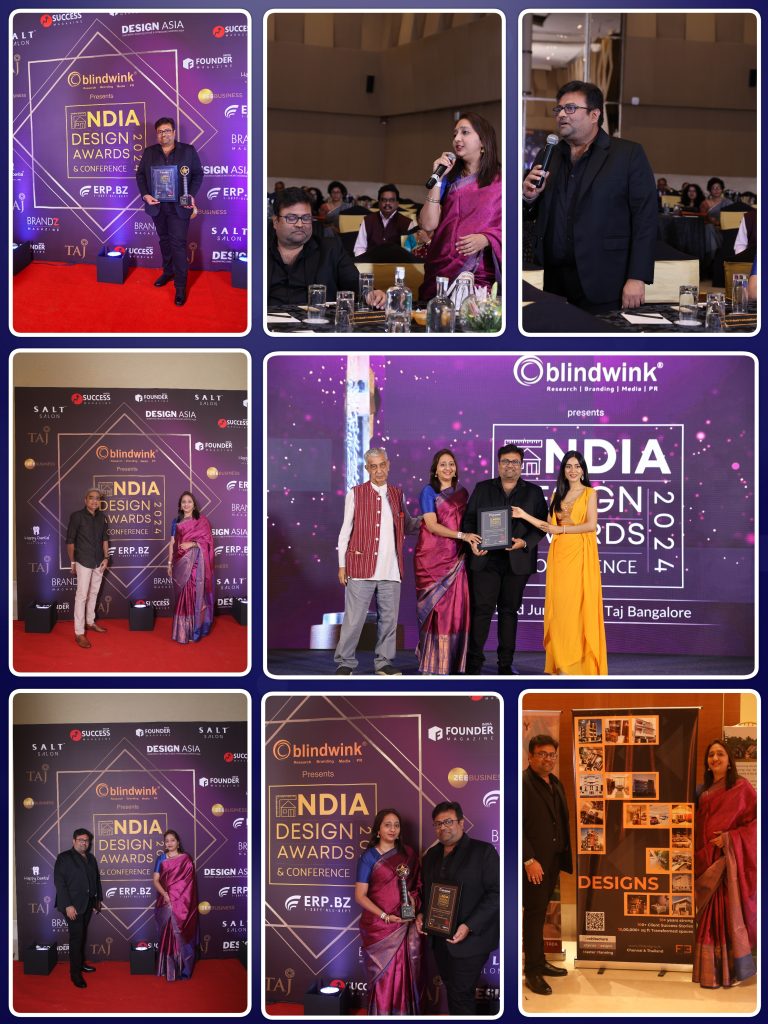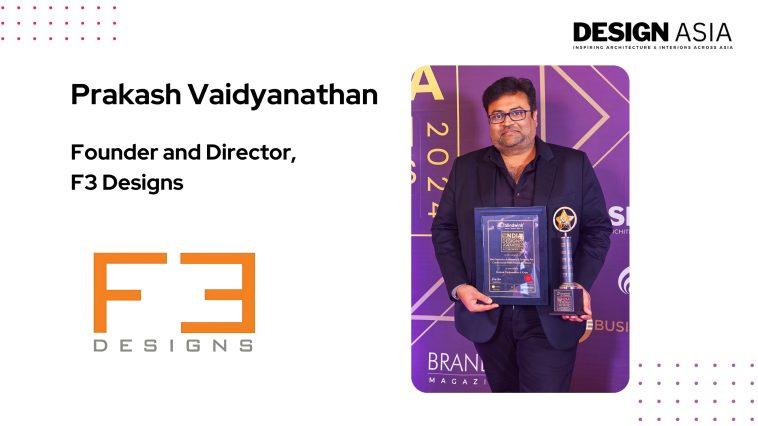An exclusive interview with H. Prakash Vaidyanathan, the visionary founder behind F3 Designs (www.f3designs.in) , a distinguished architectural and interior design firm based in Chennai, Tamil Nadu. H. Prakash Vaidyanathan’s journey into architecture was shaped by early exposure to the construction industry through his father’s business. This childhood experience ignited a passion that led him to pursue a Bachelor of Architecture degree, where his practical insights gave him a unique advantage.
After gaining valuable experience under a seasoned architect, H. Prakash Vaidyanathan founded F3 Designs in 2009, initially focusing on office interiors before expanding into architecture, interior design, landscape architecture, and project management. Central to F3 Designs’ ethos is a commitment to sustainable architecture, integrating eco-friendly practices and innovative solutions to enhance urban environments.
Throughout his career, H. Prakash Vaidyanathan has prioritized functionality, innovation through technology, and aesthetic excellence, positioning F3 Designs as a leader in the industry. His firm’s success is marked by its impact on urban development, economic growth through local job creation, and promotion of environmental sustainability.
In this interview, H. Prakash Vaidyanathan shares insights into his journey, the philosophy driving F3 Designs, and its future aspirations in the global architectural landscape.
1. Can you tell us a bit about yourself and what led you to pursue architecture, eventually starting your own firm, F3 Designs?
From a young age, I was deeply immersed in the world of construction, owing to my father’s business in manufacturing steel windows and doors. This exposure ignited my interest in architecture, as I spent school holidays and weekends visiting construction sites. These early experiences laid a solid foundation and nurtured my passion for architecture, inspiring me to pursue it as a career. During my Bachelor of Architecture program, my practical knowledge from my family business gave me a unique advantage, helping me grasp the theoretical aspects more deeply. Despite my early inclination to start my own practice, my father advised gaining practical experience under a seasoned architect, which proved invaluable. After this enriching experience, I ventured into establishing F3 Designs in 2009, starting with small office interiors and gradually expanding our portfolio over the past 15+ years.
2. Could you define F3 Designs and its current status?
F3 Designs, based in Chennai, Tamil Nadu, is an architectural and interior design firm renowned for creative and sustainable design solutions. Since our inception, we’ve diversified into architecture, interior design, landscape architecture, and project management, serving various sectors. Our commitment to innovation and excellence has enabled us to expand internationally, broadening our influence and project scope beyond India.
3. How does F3 Designs impact society through its architectural and design solutions?
F3 Designs contributes significantly to urban development by enhancing the built environment through innovative and sustainable design practices. By prioritizing eco-friendly materials, energy efficiency, and sustainable construction methods, we not only reduce environmental impact but also promote long-term urban sustainability. Our involvement in diverse construction projects stimulates local economic growth, creating job opportunities and supporting community resilience.
4. What are the core specializations of F3 Designs in architecture and design?
Our specialization lies in Sustainable Architecture, emphasizing environmental responsibility and user-centric design. We integrate advanced technologies like Building Information Modeling (BIM) and smart building systems to enhance project precision and efficiency. Our designs also focus on functionality and practicality, ensuring every space is optimized for usability and adaptability.
Sustainable Architecture
Environmental Responsibility: We prioritize eco-friendly materials, energy efficiency, and sustainable construction methods in all our projects. This includes using renewable resources, incorporating passive solar design, and implementing green roofs and walls to enhance building performance and reduce environmental impact.
Waste Reduction: Our designs aim to minimize waste during construction and throughout the building’s lifecycle. This involves careful planning, material selection, and recycling or reusing materials wherever possible.
Functionality:
User-Centric Design: We ensure that every space we design is functional, comfortable, and tailored to the needs of its users. This includes optimizing layouts for efficient circulation, accessibility, and adaptability to changing needs.
Practical Solutions: Functionality is at the heart of our design process. We focus on creating spaces that are not only beautiful but also practical and efficient, ensuring that they serve the intended purpose effectively.
Innovation through Technology:
Advanced Design Tools: We leverage the latest technology and techniques in our design process. This includes using Building Information Modeling (BIM) for detailed project visualization and management, ensuring precision and efficiency.
Smart Building Systems: Incorporating smart technology into our designs enhances building performance, energy management, and user comfort. This includes automated lighting, HVAC systems, and smart appliances that improve overall efficiency.
Green Materials: We use materials such as reclaimed wood, recycled metal, and low-VOC paints to reduce environmental impact and enhance indoor air quality.
Energy Efficiency:Our designs incorporate energy-efficient systems such as LED lighting, high-performance insulation, and renewable energy sources like solar panels.
Water Conservation:Implementing rainwater harvesting systems, low-flow fixtures, and drought-resistant landscaping to conserve water and reduce consumption.
Commitment to Sustainable Growth
Expanding Internationally: As we expand our reach beyond India, we aim to bring our expertise in sustainable architecture to new markets. Our goal is to promote eco-friendly practices globally, contributing to a more sustainable built environment worldwide.
Continuous Improvement:We believe in continuous learning and improvement. By staying updated with the latest advancements in sustainable design and construction technologies, we ensure that our projects are at the forefront of innovation and environmental stewardship.
5. What unique challenges does F3 Designs aim to solve, and what is your firm’s unique selling proposition?
F3 Designs addresses the challenge of sustainable urban development by integrating eco-friendly practices and advanced technologies into our projects. Our unique selling proposition lies in our commitment to sustainability, functionality, innovation, and aesthetic excellence. We blend these elements to deliver holistic design solutions that exceed client expectations and contribute positively to the environment.
6. What encouraged you to start F3 Designs, and what are your future prospects for the business?
My passion for architecture and a clear vision for creating impactful designs drove me to establish F3 Designs. Looking ahead, our future prospects are bright, with opportunities for growth in international markets, technological integration, and service diversification. By focusing on sustainable design, client-centric innovation, and strategic partnerships, we aim to lead in the architectural industry while contributing to global sustainability goals.
7. Whom do you consider as your inspiration/Idol professionally and why?
In the field of architecture, my inspirations are Le Corbusier and Zaha Hadid. Le Corbusier’s pioneering work in modern architecture and urban planning resonates deeply with me. His emphasis on functionality and harmony between built environments and nature continues to influence my approach. Zaha Hadid, on the other hand, inspires me with her bold, futuristic designs and innovative use of technology, challenging conventional architectural norms.
8. What type of struggles/problems did you face as an entrepreneur? What has been your learning from them and how did you overcome them? Anything from your personal life that may have impacted you professionally?
As an entrepreneur in architecture, navigating client expectations and managing projects effectively have been ongoing challenges. These experiences have taught me the importance of clear communication, meticulous planning, and adaptability. Personally, balancing work and family commitments has strengthened my resilience and time management skills, crucial for entrepreneurial success.
9. What were the essentials needed to start your business or pursue your profession?
Starting a career in architecture necessitates a solid educational foundation, licensure, and proficiency in architectural software. Beyond technical skills, establishing a robust business plan, cultivating client relationships, and staying abreast of industry trends are essential for long-term success.
10. How did you identify the opportunity in the market?
Identifying architectural opportunities involves thorough market research, networking with industry professionals, and understanding client needs. By staying informed about development projects and specializing in niche markets like sustainable design, I’ve been able to capitalize on emerging opportunities effectively.
11. What makes you unique as an entrepreneur? Anything from your personality that has helped you professionally?
My creativity, vision for impactful design, and client-centric approach distinguish me as an entrepreneur. I believe in fostering strong team dynamics, taking calculated risks, and embracing continuous learning—all of which contribute to delivering exceptional architectural solutions.
12. Any project or work closest to your heart that you would like to share about it?
One of my most cherished projects involved revitalizing a historic building into a vibrant community space. Preserving its architectural heritage while integrating modern functionality was immensely rewarding, reflecting my commitment to sustainable urban development.
13. The trend has been shifting towards sustainable & green architecture, what is your say on the same?
The shift towards sustainable architecture is pivotal for our future. It promotes environmental responsibility, enhances occupant well-being, and aligns with evolving regulatory standards. Embracing sustainable practices not only meets market demands but also fosters innovation and resilience in architectural design.
14. How important is to understand client psychology and requirements besides the knowledge & skill in architecture?
Understanding client psychology is integral to successful architectural practice. It ensures designs are not only aesthetically pleasing but also functionally aligned with user needs. Building trust, anticipating challenges, and delivering customized solutions are critical for client satisfaction and project success.
15. What have been your learnings from entrepreneurship/ your profession?
My journey in architecture has taught me the importance of design thinking, technical proficiency, and collaboration. Upholding ethical standards, embracing sustainability, and prioritizing client relationships are foundational to creating impactful architectural solutions.
16. What message and lesson would you give to budding architects & designers?
Embrace lifelong learning, balance creativity with practicality, and respect contextual influences. Collaborate effectively, innovate purposefully, and prioritize sustainability in your designs. Develop your unique voice, pay attention to detail, and persevere through challenges to achieve professional fulfillment.
17. Any awards won?
Yes, Blindwink India Design Awards and Conference 2024

Projects In Chennai– F3 Designs, Founder and Director, Mr.Prakash Vaidyanathan & Mrs.Kripa Prakash
received award from Actress amrita Rao and Architect Krishna Rao Jaisim



